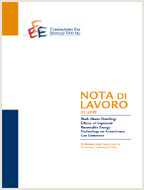Rent Seekers in Rentier States: When Greed Brings Peace

20.03.2010
Kjetil Bjorvatn, Alireza Naghavi
D74, Q34
Rent Seeking, Rentier States, Resource Rents, Conflict, Patronage Employment
Economy and Society
Gianmarco I.P. Ottaviano
Are natural resources a source of conflict or stability? Empirical studies demonstrate that rents from natural resources, and in particular oil, are an important source of civil war. Allegedly, resource rents attract rent seekers, which destabilize society. However, there is a large literature on how so-called rentier states manage to pacify opposition groups by handing out special favors. The present paper attempts to bridge the gap between the rent-seeking view of resource rents as a source of conflict and the rentier state view which emphasizes the role of resource rents in promoting peace and stability, and show how one may lead to the other. The mechanism that we highlight relies on the notion that higher rents may activate more interest groups in a power struggle. We demonstrate that the associated increased cost of conflict may in fact promote social stability. The peaceful solution is upheld by a self reinforcing transfer program, in the form of patronage employment. The chance of conflict and rent dissipation in our model is highest for intermediate levels of resource rents, where the government cannot make credible commitments to the opposition groups.
